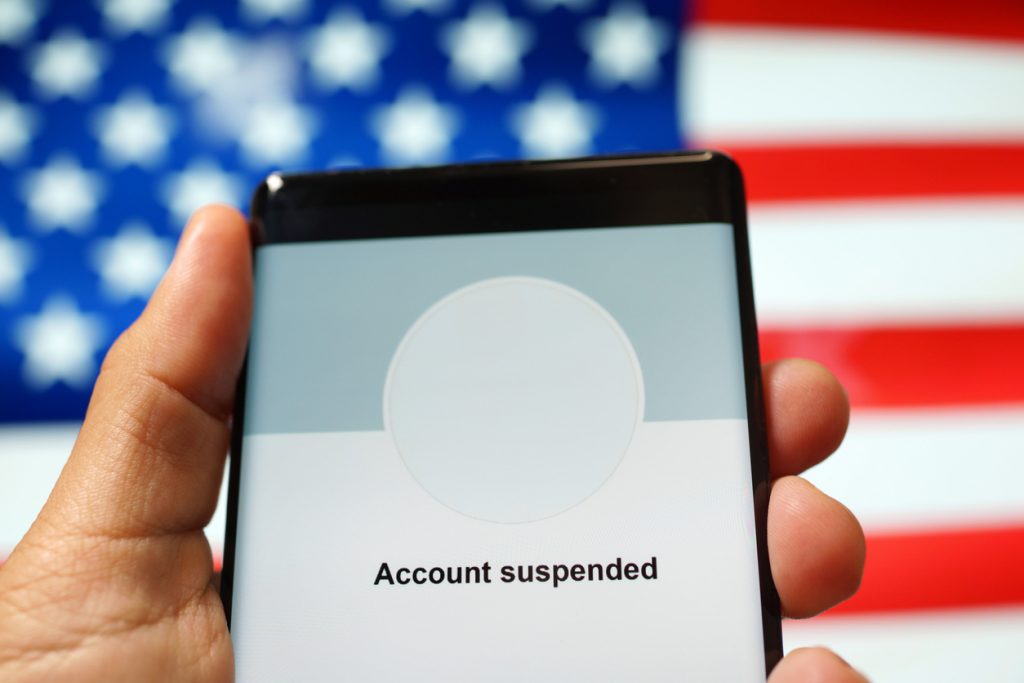
With about 72% of Americans using social media to share their thoughts, access information, or seek entertainment, social media companies’ content moderation policies and practices have become a topic of conversation. Three-quarters of U.S. adults find it very or somewhat likely that social media platforms intentionally censor information dealing with political viewpoints that are objectionable to the platforms. In response to these concerns, especially as social media companies have started fact-checking and flagging users’ posts, legislators in 34 states have introduced over 100 bills in 2022 to regulate how social media companies deal with user posts. The focus of pending anti-censorship legislation includes regulating addictive algorithms and company transparency on content moderation decisions. As of October 2022, two states have passed legislation of this nature: Florida and Texas. However, Florida’s SB7072 and Texas’ HB20 have both faced legal challenges on a wide range of constitutional and statutory grounds.
Alaska: Stop Social Media Censorship Act
In February 2022, state lawmakers introduced SB214, the Stop Social Media Censorship Act, to prohibit social media platforms from purposefully fact-checking, deleting, or using an algorithm to suppress, shadow ban, or censor the posts of a platform user (especially if the post is of political or religious nature). The bill would make exceptions for the moderation of posts that call for immediate acts of violence, display pornographic material, invite criminal behavior, or involve bullying or harassment (especially of minors). If a social media company violates any of the bill’s provisions, the bill would permit an impacted platform user to sue the company for any actual damages, a fine of no less than $75,000 for each offense, and any other appropriate equitable relief. The State Senate referred the bill to the Senate Judiciary Committee in March 2022.
Arizona: Anti-Censorship Bill Stalls
At the end of January 2022, lawmakers introduced SB1344 to prohibit social media companies’ willful “de-platforming” of known political candidates until the election date has passed or the individual’s candidacy discontinues. Under the bill, the Secretary of State could determine if social media platforms have violated that provision and impose a civil penalty of $250,000 per day if the candidate is running for a statewide office or $25,000 per day if the candidate is running for any other office. The bill would also require social media platforms to publish the standards (and notify platform users of any updates to these standards) a company uses to ban platform users accused of violating content policies. Unless a user were de-platformed for obscene posts, they would receive a written notification identifying why and how their content was objectionable. They would also have access to it for at least sixty days following their loss of platform access. Impacted platform users could bring a private cause of action for a social media company’s violation of these provisions. In turn, violators could be held responsible for actual damages, payment of up to $100,000 for each proven claim, punitive damages, and other equitable relief. The State Senate read the bill for the second time on January 26, 2022, and referred it to the Senate Transportation and Technology Committee.
Michigan: Stalled Legislation
HB5973, legislation introduced by state lawmakers in March 2022, would define certain social media platforms as common carriers and prohibit them from blocking or discriminating against certain communications. Users would include those who reside in the state, do business there, and share or receive expression in the state. Exceptions to those provisions would consist of the following:
- Posts encouraging criminal activity.
- Posts threatening violence to a particular group or individual.
- Sexually explicit posts.
Violation of those provisions could entitle affected users to declaratory relief, injunctive relief, costs, and attorney fees. The State House electronically reproduced the bill on March 24, 2022, and referred it to the House Communications and Technology Committee.
New Jersey: Social Media Standards
At the start of 2022, lawmakers introduced S595, legislation that requires social media platforms to publish the standards (and notify users of changes to these standards) used for content moderation, the selective suspension of a user, and the implementation of an anonymous content/user bans. In addition, the bill would require that social media companies apply standards consistently and fairly among all their users. The legislation would also prohibit social media companies from using post prioritization or anonymous content/user-banning algorithms on content posted by or about a candidate running for an elected office or a journalistic enterprise. The bill would require that platforms notify blocked accounts via a written statement that explains why and how the user’s content was deemed objectionable. Social media companies that violate the provisions of this bill could be responsible for payments of up to $100,000 per proven claim, actual damages, punitive damages, other forms of equitable relief, and attorney fees. The State Senate referred the bill to the Senate Commerce Committee on January 11, 2022.
South Carolina: Anti-Censorship Social Media Bill
In January 2022, state lawmakers introduced H4528 , also known as the Stop Social Media Censorship Act. The bill would prohibit social media platforms from applying content moderation policies to users for posts involving religious or political speech. The legislation would make it unlawful for a platform to ban a user at any time. Users proven to have had their rights violated under this law could be awarded a minimum of $75,000 for each proven intentional act of censorship of their speech, actual damages, punitive damages, other forms of equitable relief, or attorney fees. Exceptions to these provisions include posts that encourage immediate acts of violence, posts involving obscene material, false impersonation, and posts involving bullying and harassment (especially of minors). Finally, the bill would fine platforms that block a political candidate $100,000 per day for candidates running for a statewide office and $10,000 per day for candidates running for any other elected office. The State House referred the bill to the House Judiciary Committee on January 11, 2022.
Latest News
Photo credit: iStock.com/StudioGraphic As technology continues to evolve, digital driver's licenses (also known as mobile IDs) are gaining traction across the United States. States are increasingly exploring legislative measures to modernize driver identification systems, enabling [...]
NetChoice and AI regulation In this episode of the Back in Session podcast, hosts Ryan Stevens and Ryan DeMara sit down with Amy Bos, Director of State and Federal Affairs at NetChoice, to discuss the [...]
Photo credit: iStock.com/yacobchuk The use of cell phones by students in classrooms is on the rise, despite 77% of schools prohibiting cell phones at school for non-academic use. With students often disregarding these rules or [...]
In the latest episode of the "Back in Session" podcast, hosts Ryan Stevens and Ryan DeMara delve into the innovative world of AI technology applied in gun detection with Burgess Nichols from ZeroEyes. Starting with [...]





Stay In Touch